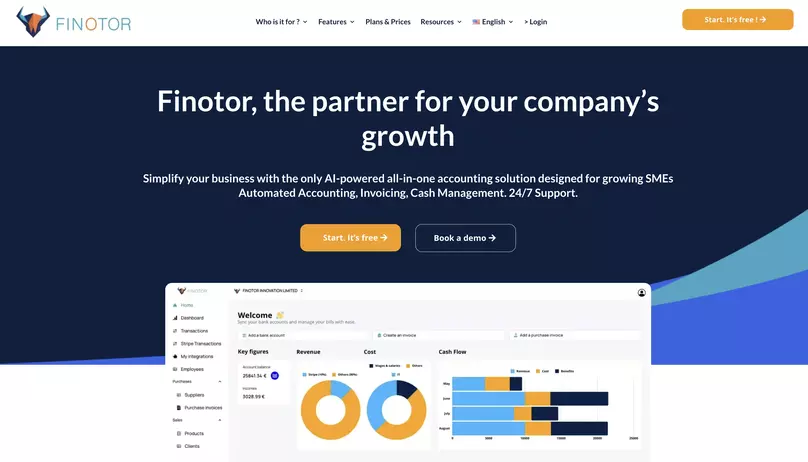Contents
Understanding the Basics of Small Business Bookkeeping
For any small business aiming to thrive in today’s competitive market, mastering the basics of bookkeeping is an essential skill that cannot be overlooked. Accurate and efficient bookkeeping practices lay the foundation for financial stability and informed decision-making. Let’s delve into the fundamental aspects of small business bookkeeping that can set your enterprise on the path to financial mastery.
Setting up Your Chart of Accounts
At the heart of bookkeeping lies the Chart of Accounts (CoA), a structured list of all the financial accounts in your business’s general ledger. Think of it as the backbone of your financial infrastructure, categorizing each transaction your business makes into assets, liabilities, equity, revenue, and expenses. A well-organized CoA leads to clearer financial insights and easier tax preparation. For in-depth guidance, refer to resources like NerdWallet or Forbes Advisor that can help you structure your CoA effectively.
Distinguishing Between Expenses and Assets
It’s critical for small businesses to differentiate between expenses and assets. Expenses are the costs incurred during the course of everyday business operations, such as rent or utilities, while assets are resources that provide future economic benefit, like equipment or property. Distinguishing between the two affects how items are recorded on your balance sheet and income statement, and it has significant implications for your taxation and cash flow management. Misclassification can lead to distorted financial statements, so accurate categorization is key.
Keeping Accurate Records of Financial Transactions
Every financial move your business makes should be documented with precision. Accurate record-keeping not only keeps you compliant with legal and tax obligations but also arms you with the necessary data to make strategic business decisions. From sales invoices to expense receipts, each document should be recorded and archived systematically. Leveraging modern software solutions can significantly streamline this process. For instance, Finotor offers a comprehensive tool for managing financial records, ensuring that your business stays on top of its financial health.
Implementing Efficient Bookkeeping Practices
Once the foundation has been set, it’s time to build upon it with efficient bookkeeping routines. The key to efficiency is consistency and the use of tools that automate and simplify the process. Let’s explore how you can optimize your bookkeeping practices to save time and reduce errors.
Utilizing Bookkeeping Software
The days of manual bookkeeping are long gone for most businesses. In our digital age, numerous software options are available to automate the entry, tracking, and management of financial transactions. Bookkeeping software can reduce errors, streamline processes, and provide real-time financial insights. When selecting software, consider features such as ease of use, integration capabilities, and scalability to grow with your business.
Regularly Reconciling Bank Statements
Reconciliation is the process of ensuring that your internal financial records match the transactions recorded by your bank. This practice, done regularly, can catch errors, prevent fraud, and give you a true picture of your cash position. It’s a critical step that should be performed at least monthly to keep your finances in check and can be made easier with the right bookkeeping tools.
Creating a Routine for Managing Receipts and Invoices
A systematic approach to managing receipts and invoices can vastly improve your bookkeeping efficiency. Develop a routine that includes timely data entry, organized storage, and regular reviews to keep everything up-to-date. This routine should also extend to digital transactions, ensuring that your electronic records are just as accurate and organized as their physical counterparts.
Advanced Bookkeeping Strategies
As your small business grows, you’ll want to adopt more sophisticated bookkeeping strategies that can provide deeper insights and support more complex financial tasks. These strategies involve a proactive approach to managing your finances and leveraging data for long-term success.
Leveraging Financial Reports for Decision Making
Financial reports are the culmination of your bookkeeping efforts, synthesizing data into actionable insights. Regularly generated reports such as profit and loss statements, balance sheets, and cash flow statements are invaluable for tracking your business’s financial health and informing strategic decisions. Understanding how to interpret these reports can give you a significant competitive edge.
Understanding Cash Flow Management
Cash flow management is the art of monitoring, analyzing, and optimizing the net amount of cash moving into and out of your business. It’s about timing your inflows and outflows effectively to maintain liquidity and avoid shortfalls. A deep understanding of your cash flow cycle is crucial to ensure operational continuity and to facilitate growth.
Maximizing Deductions with Strategic Expense Tracking
Tracking expenses meticulously throughout the year can lead to substantial tax savings by maximizing eligible deductions. By categorizing each expense accurately, you can take full advantage of tax laws and reduce your taxable income legally and effectively. This strategic approach to expense tracking requires diligence and foresight but can significantly impact your bottom line.
Integrating Technology in Bookkeeping
Technology has revolutionized the field of bookkeeping by introducing tools and platforms that automate tasks and provide real-time financial insights. The integration of these technologies can transform your bookkeeping practices, making them more efficient and accurate.
Automating Finances with Artificial Intelligence (AI)
AI and machine learning are at the forefront of financial automation. These technologies can learn from your financial patterns, automate repetitive tasks, and even predict future financial scenarios. AI-driven bookkeeping solutions can free up valuable time for business owners to focus on growth and strategic planning.
Seamless Integration with Banking and E-commerce Platforms
The ability to integrate seamlessly with banking systems and e-commerce platforms like Stripe and WooCommerce simplifies the reconciliation process and ensures that your financial data is comprehensive and up-to-date. Platforms such as Finotor excel in providing these integrations, streamlining the financial management of your business.
Utilizing Real-Time Data for Financial Analysis
Access to real-time financial data is a game-changer for small businesses. It allows for prompt responses to financial trends, immediate correction of errors, and informed decision-making. Technology that supports real-time data analysis can give business owners an unparalleled overview of their company’s financial status at any given moment.
Implementing Efficient Bookkeeping Practices
For small business owners, mastering the art of bookkeeping is not just about keeping financial records; it’s about implementing systems that simplify the process and make your financial oversight both effective and efficient. By focusing on three crucial strategies, you can ensure that your bookkeeping practices contribute positively to your overall business mastery.
Utilizing Bookkeeping Software
One of the first steps in streamlining your bookkeeping is to employ bookkeeping software that can handle the complexities of your financial data. The right software should offer intuitive interfaces and robust features that allow for quick entries, error reduction, and easy access to financial statements. Bookkeeping software becomes a central hub for all your financial activities, enabling you to keep track of your finances efficiently.
When selecting a bookkeeping software, look for options that can scale with your business. As your business grows, your financial needs will become more complex. A software solution like Finotor not only keeps up with your growing needs but also integrates advanced features such as AI-driven analytics, making it easier to interpret your financial data for strategic decision-making.
Regularly Reconciling Bank Statements
Reconciliation is an essential component of bookkeeping, which involves matching your book records to your bank statements to ensure accuracy. Regularly reconciling your bank statements helps you to catch and correct any discrepancies, preventing financial errors that could lead to larger issues. It’s a critical step for maintaining the integrity of your financial records.
Moreover, modern bookkeeping solutions provide seamless integration with banking platforms, significantly reducing the manual effort involved in reconciliation. By automating this process, you can save time and reduce the potential for human error, allowing you to focus more on the strategic aspects of your business.
Creating a Routine for Managing Receipts and Invoices
Disorganization can be the downfall of small business finance management. Creating a consistent routine for managing receipts and invoices ensures that all financial transactions are recorded and accounted for. This not only prepares you for tax season but also provides a clear picture of your business expenses and income.
Utilize digital tools and software that can help you store, organize, and track your receipts and invoices. Implementing a system where these documents are captured electronically and linked to corresponding transactions in your bookkeeping software, like suggested in the basics of small business bookkeeping, can be a game-changer. This not only creates a paperless environment but also streamlines the process of financial tracking and reporting.
By employing these efficient bookkeeping practices, small business owners can take control of their financial health and make informed decisions that drive business success. Remember, effective bookkeeping is not just about recording financial transactions; it’s about creating a reliable system that supports your business growth and financial mastery.
Integrating Technology in Bookkeeping
In the current business landscape, where efficiency and accuracy are paramount, integrating technology into bookkeeping processes is no longer an option—it’s a necessity. For small business owners aiming for mastery in financial management, leveraging cutting-edge tools can transform the way you handle your finances. This section explores how technology, particularly artificial intelligence (AI), can automate and refine your bookkeeping practices.
Automating Finances with Artificial Intelligence (AI)
Artificial Intelligence has revolutionized many aspects of business, and bookkeeping is no exception. AI-powered software can now automate repetitive tasks such as data entry, categorization of expenses, and even predict cash flow patterns. By implementing AI into your bookkeeping systems, you not only reduce the risk of human error but also free up valuable time to focus on strategic decisions. Finotor, for instance, offers a comprehensive solution that integrates AI to assist businesses in managing their accounting and financial operations more effectively.
Seamless Integration with Banking and E-commerce Platforms
Today’s businesses operate on a multitude of platforms, from online banking to e-commerce. A key advantage of modern bookkeeping software is its ability to integrate seamlessly with these services. Solutions like Finotor offer direct links with banking systems and platforms such as Stripe and WooCommerce, which simplifies the reconciliation process and ensures that your financial records are always up to date. This kind of integration enables a more cohesive financial overview and streamlines transaction management.
Utilizing Real-Time Data for Financial Analysis
In the fast-paced world of small business, decisions often need to be made quickly and with confidence. Access to real-time financial data is crucial for informed decision-making. With the right technology, you can monitor your business’s financial health at any moment, allowing for proactive adjustments and strategic planning. Advanced bookkeeping tools analyze and provide insights into your finances, helping to identify trends and inform future business moves. Understanding the basics of bookkeeping is critical, and integrating real-time data analysis can elevate your financial strategy.
Integrating advanced technology into your bookkeeping practices not only enhances efficiency but also provides a strategic edge. As you move towards bookkeeping mastery, consider how tools like Finotor can help you stay ahead in managing your business’s financial landscape. Moreover, engaging with online communities such as Reddit’s bookkeeping forum can provide additional insights and support. Embrace the technological advancements in bookkeeping, and watch your small business thrive.
Integrating Technology in Bookkeeping
In the digital age, small businesses can gain a significant edge by integrating technology into their bookkeeping processes. With the right tools and strategies, entrepreneurs can streamline operations, reduce errors, and gain valuable insights into their financial health. This segment explores how technology can be effectively utilized to enhance bookkeeping practices.
Automating Finances with Artificial Intelligence (AI)
Automating your financial processes with AI can revolutionize how you handle bookkeeping tasks. AI technologies enable the automation of repetitive tasks such as data entry and categorization, saving precious time and minimizing human error. Advanced AI systems can also provide predictive analysis, helping you to anticipate financial trends and manage cash flow more effectively. For instance, Finotor utilizes AI to automate financial management, making it an invaluable tool for businesses looking to enhance their bookkeeping efficiency.
Seamless Integration with Banking and E-commerce Platforms
One of the key aspects of modern bookkeeping is the ability to integrate seamlessly with banking and e-commerce platforms. With solutions like Finotor, businesses can connect directly to their bank accounts and platforms like Stripe and WooCommerce. This integration simplifies bank reconciliations and ensures that all transactions are automatically recorded and categorized. This connectivity not only saves time but also provides a more comprehensive view of financial data. For guidance on setting up such systems, resources like WikiHow’s bookkeeping guide can be particularly useful.
Utilizing Real-Time Data for Financial Analysis
Access to real-time data is a game-changer for financial analysis and decision-making. Real-time reporting offers up-to-the-minute insights into your business’s financial status, allowing for more informed decisions. This immediacy helps in identifying trends, managing cash flow, and spotting potential issues before they become problematic. With platforms like Finotor, small businesses have the capability to analyze their financial data in real-time, supported by a 24/7 customer service to assist with any queries. Moreover, communities like Reddit’s small business forum can offer peer support and advice on leveraging real-time data effectively.
In conclusion, by integrating advanced technologies into your bookkeeping practices, you can ensure a more efficient, accurate, and insightful financial management process. Whether through AI, seamless integrations, or real-time data, the embrace of technology is indispensable for small business mastery in bookkeeping.









